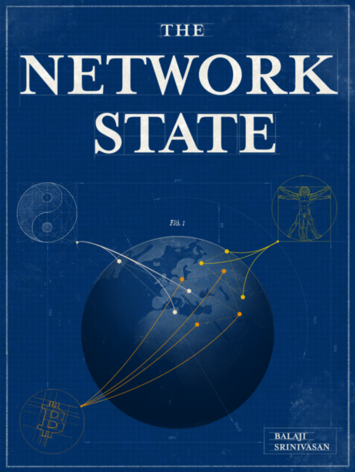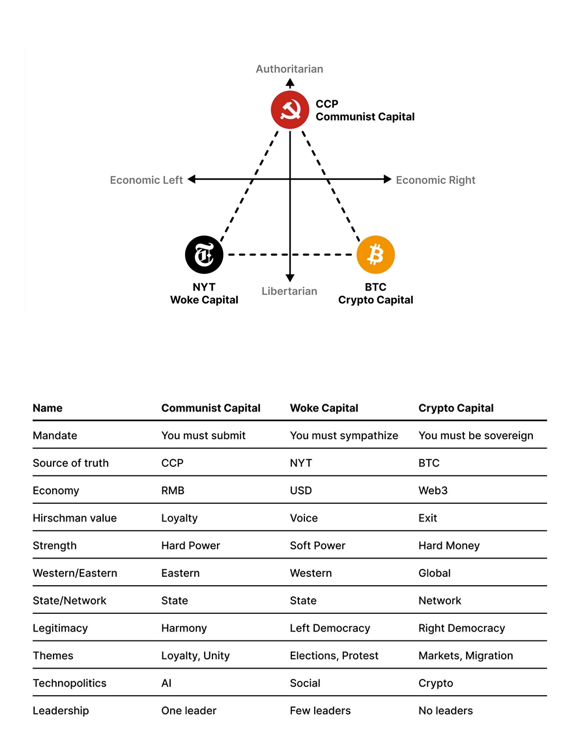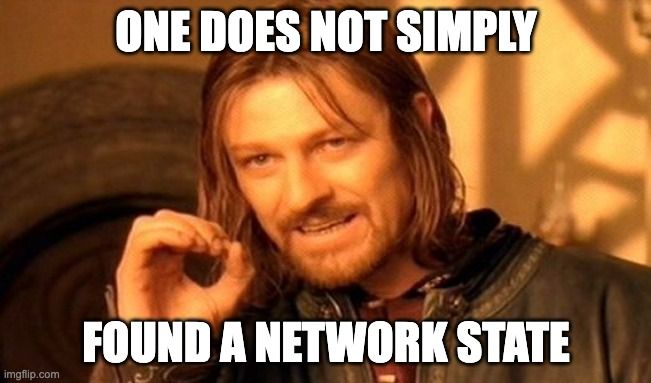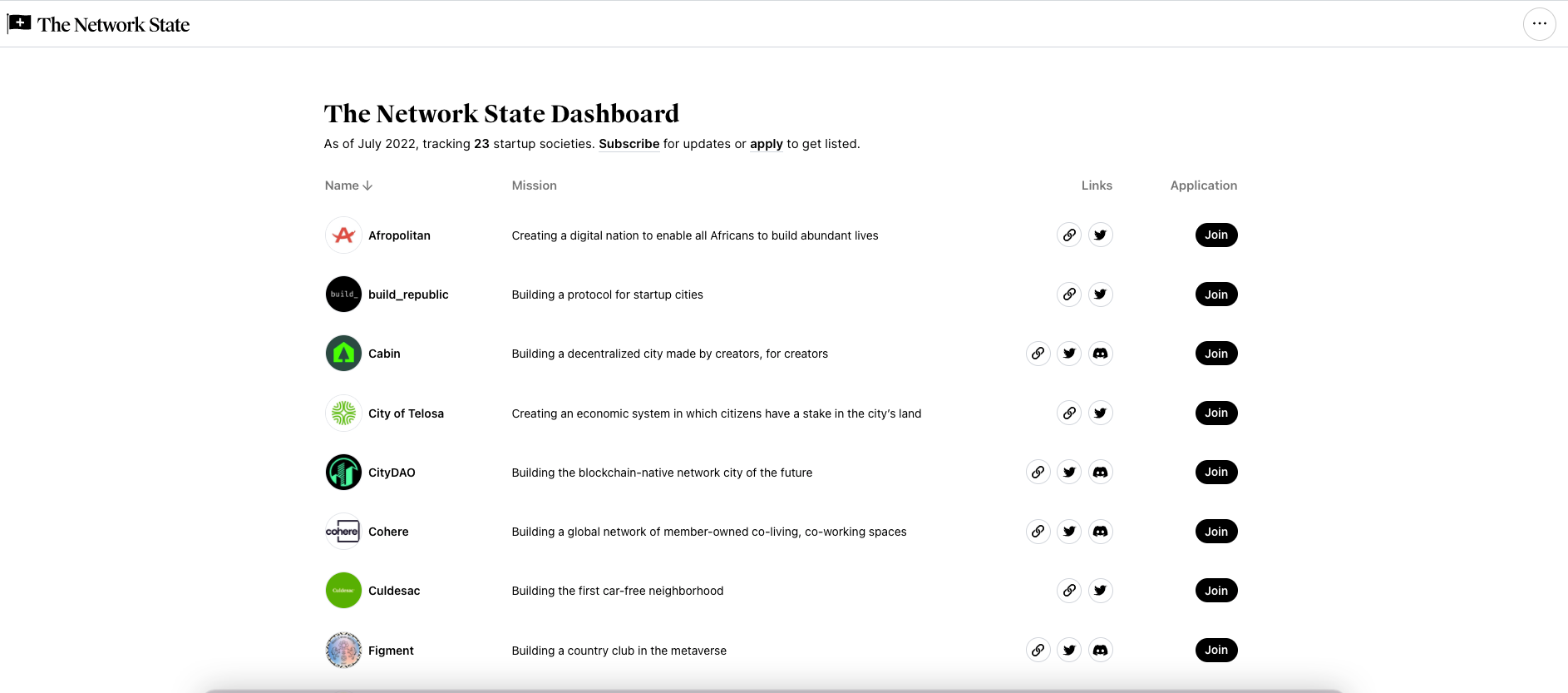
Balaji Srinivasan's new book, The Network State, is being hailed as an inspiring masterpiece by admirers. Critics are dismissing it as cynical, dangerous propaganda.
i really enjoyed @balajis's https://t.co/BUqDHaj7CG - available in an ever-improving, free, online format.
— Jesse Pollak (jesse.xyz) (@jessepollak) July 17, 2022
powerful overview of how crypto networks will transform our world.
and the way balaji creates mental models, then uses them to describe the past & future is incredible.
So people must “exit” and start their own country. They get rich off the current order, then take the money and run
— Bucco Capital (@buccocapital) July 10, 2022
It’s like a shitty Yuval Noah Harari on steroids
It’s why they love Bitcoin.
Here he is indoctrinating the YC class of 2013 https://t.co/XZtP075yI8
The first aspect of the book's core premise is uncontroversial – technological innovations such as the Internet, Bitcoin, and VR/AR enable radically new forms of large-scale social organization.
The provocative part comes when Balaji argues these technologies can, and should, be leveraged to create "Network States" that will open up new frontiers for experimentation in governance. Network states will eventually rival nation-states in terms of influence.
I am unabashedly in the group of admirers and would like to briefly summarize some important concepts from the book before giving my personal take on the idea of network states.
History as Trajectory
The first section of the book is dedicated to history because anyone trying to start a new society needs to understand history.
These are some of Balaji's key personal takes on history. Observations about the past and speculations about their implications for the present and future. Many of these ideas are controversial. If you're skeptical I encourage you to read the book, review his arguments, and check his citations.
- Startups companies identify economic problems in the market and present technologically-informed solutions to those problems in the form of new companies. Startup societies identify moral issues in today's culture and present historically-informed solutions to those issues in the form of new societies.
- The modern U.S. and Chinese establishments only focus on history that the establishment finds to be politically useful against internal and external rivals. To know when states are lying or not we need a form of truth powerful enough to stand outside any state. Blockchains can help address this by allowing us to create cryptographically verifiable macrohistory of off-chain events. Cryptohistory.
- Humanity's first "Leviathan" that ensured people behaved in pro-social ways was God, who would smite you if you mis-behaved. Then came The State which would punish you. A new Leviathan, The Network, is emerging that either won't let you steal or will detect your bad behavior with AI.
- The U.S. establishment was better for its citizens and allies than its USSR opponents. The current U.S. establishment is not on balance a force for good abroad or at home. The historical inevitability and desirability of the US establishment's victory over all opponents is in question.
- A strategy of decentralized defense, arming countries to defend themselves against the Chinese threat is preferable to the U.S. trying to fight a second cold war.
- Left and right can be viewed as temporary tactics, not constant classes. The left tactic is to delegitimize the existing order and fight for redistribution of scarce resources. The right tactic is to argue that the current order is just and the conflict caused by the left will destroy the resource rather than redistribute it. U.S. Republicans used to embrace left tactics while Democrats embraced right tactics. In the mid-20th century, it flipped.
- The fall of the USSR in 1991 meant the end of the centralized left (communism) and the rise of the decentralized left (wokeness.)
- The coming global conflict will be between the decentralized people of the network and the centralized people of the state. Between global technology and the American establishment.
Tripolarity
Section two describes how the world is heading towards a tripolar moment. It's the American establishment vs. the CCP vs. The Global Internet.

This state of affairs leads to complex geo-political dynamics with the potential for a variety of different alliances and long-term outcomes.
The ideal future isn't staying under the thumb of U.S. or Chinese centralization. It also isn't crypto-anarchic decentralization. It's conscious recentralization into opt-in startup societies.
Recentralization
The third section is about decentralization and recentralization.
We need to build societies with consciously chosen tradeoffs between submission, sympathy, and sovereignty rather than unconsciously capitulating to either an extreme or counter extreme. The goal is a future where we create many startup societies, get a few diplomatically recognized as network states, and rebuild high-trust societies via a re-centralized center.
The US isn't headed for fascism or communism, it's headed for anarchy.
A future U.S. civil war would have two factions:
- The U.S. federal government, established mainstream media and The Democratic party fighting for the dollar and "democracy," and against "insurrectionists."
- Those aligned with state governments, decentralized media, and The Republican Party fighting for Bitcoin and "freedom," and against "tyranny".
It will be an information war for control of minds, not a physical war for land.
Network States
After giving the background justifying the need for new societal structures, the final section goes into the transition from nation states to network states.
What is a network state?
A network state is a social network with:
- A moral innovation
- A sense of national consciousness
- A recognized founder
- A capacity for collective action
- An in-person level of civility
- An integrated cryptocurrency
- An archipelago of crowdfunded physical territories, a virtual capital
- An on-chain census that proves a large enough population, income, and real estate footprint to attain a measure of diplomatic recognition.

How might one create a Network State?
It doesn't make sense for a founder to claim they are starting a network state.

The first step is to found a startup society:
"A new society built internet first, premised on a moral critique (the one commandment) of its parent community, founded for the purpose of addressing a specific social problem in an opt-in way."
Startup societies can evolve into network unions: "wholly digital entities, organized in a social tree structure, that engage in collective action on behalf of its members."
The next step is a network archipelago: "a network union that begins acquiring and networking properties in the physical world."
Only a thriving network archipelago with a strong community, a large treasury, and significant land holdings would have a shot at achieving diplomatic recognition from a legacy state and becoming a network state.
Not all startup societies need have ambitions of becoming network states to accomplish their goals.
Why would someone want to create a network state?
Because they believe the establishment is guilty of a specific moral failure and starting a new society with like-minds is preferable to attempting to persuade a large majority that their way of doing things is wrong.
A network state would create new frontiers for people to put political theory into practice by experimenting with new governance norms and innovation in the physical world that wouldn't be permitted by the existing social structures.
Do you have any evidence that this sort of thing is possible?
Several communities are successfully experimenting with the primitives that will allow network states to emerge.
CityDAO has acquired 40 acres of land in Wyoming and is eyeing expansion into Colorado.
CabinDAO owns 40 acres of land outside of Austin, Texas and has an ambitious roadmap to expand to hundreds of cities and thousands of neighborhoods
Crypto bullish VC firm Andreesen Horowitz is moving their capital to the cloud and decentralizing their physical presence.
Andreessen Horowitz is “decentralizing to the community.” Aka using Balaji’s Network State thesis to begin the push towards becoming their own government and harder to destroy as we enter increasingly turbulent times in the US. https://t.co/CWkwHCamJi
— Autism Capital 🧩 (@AutismCapital) July 21, 2022
The Network State Dashboard is tracking the growth and progress of startup societies.

Isn't this cynical? Anti-social? Anti-American? Why not focus on reforming existing systems?
At no point in the book does Balaji claim we shouldn't put effort into reforming nation states, our world is "unfixable," or that the U.S. is doomed and should be abandoned.
Rather, the claim is that it's dangerous to be overly-dependent on clearly flawed centralized powers. Startup societies represent the best opportunity to create new open frontiers for experimentation.
This approach helps us defend ourselves against the worst aspects nation states. If successful it would give us leverage to reform existing states.
Calling the U.S. establishment out on their antics which harm the American people and proposing peaceful, opt-in remedies is one of the most pro-American things one can do.
Closing Thoughts
I'm a sucker for grand technological visions and am biased towards being inspired by this sort of futuristic out of the box thinking. Its why I took big early bets on Bitcoin and Ethereum. I recognize its not for everyone.
The Network State is an enthralling, inspiring, and well-researched read that deserves serious engagement, not casual dismissal. The expandable tree format makes it incredibly easy to navigate and digest key points.
Balaji inspired me to start thinking about the power of exit in 2013. Now he's inspired me to believe that I am capable of building the types of societies I want to live in.
